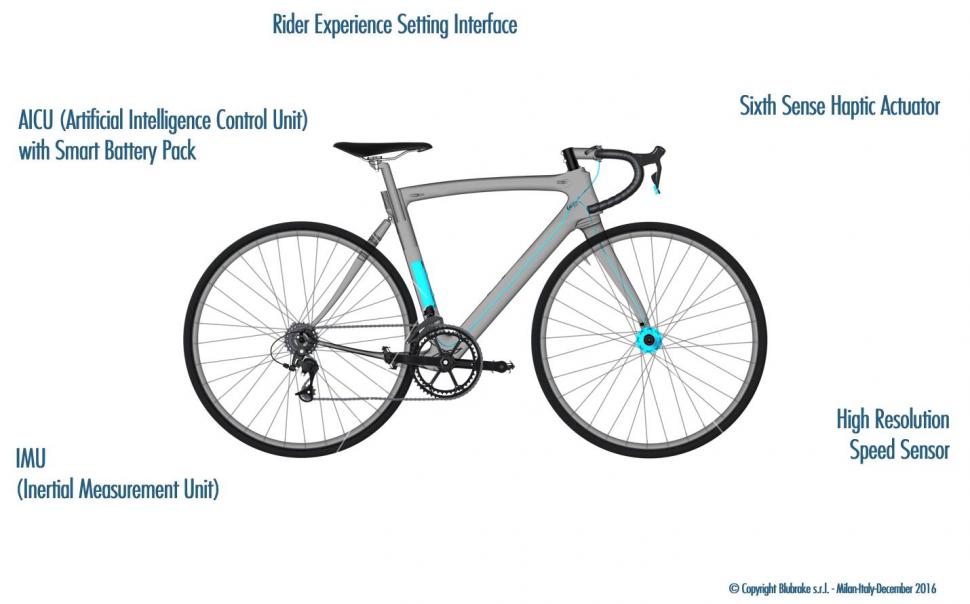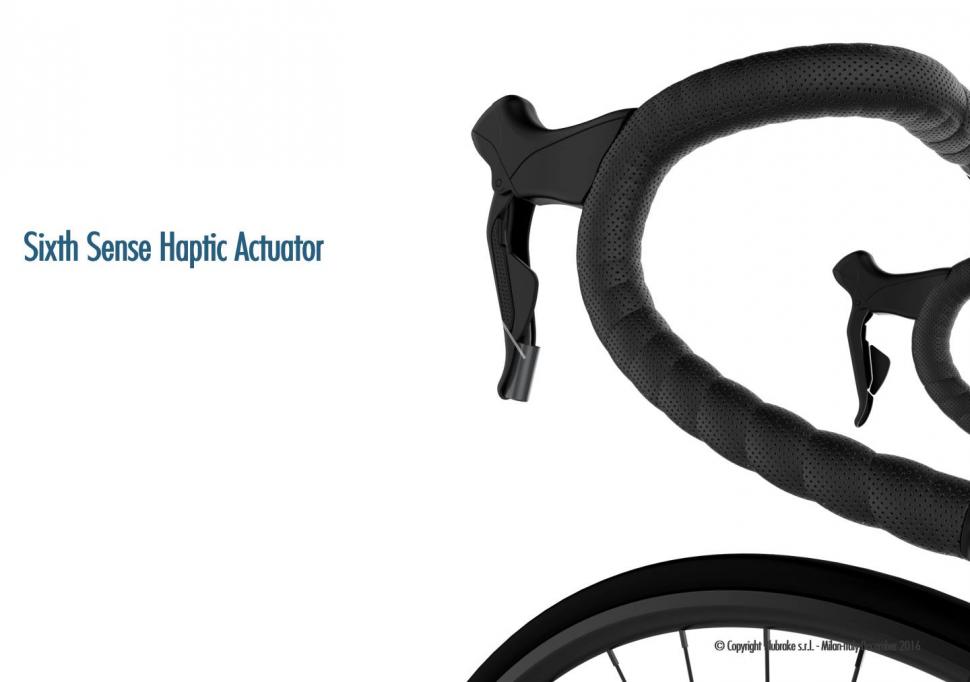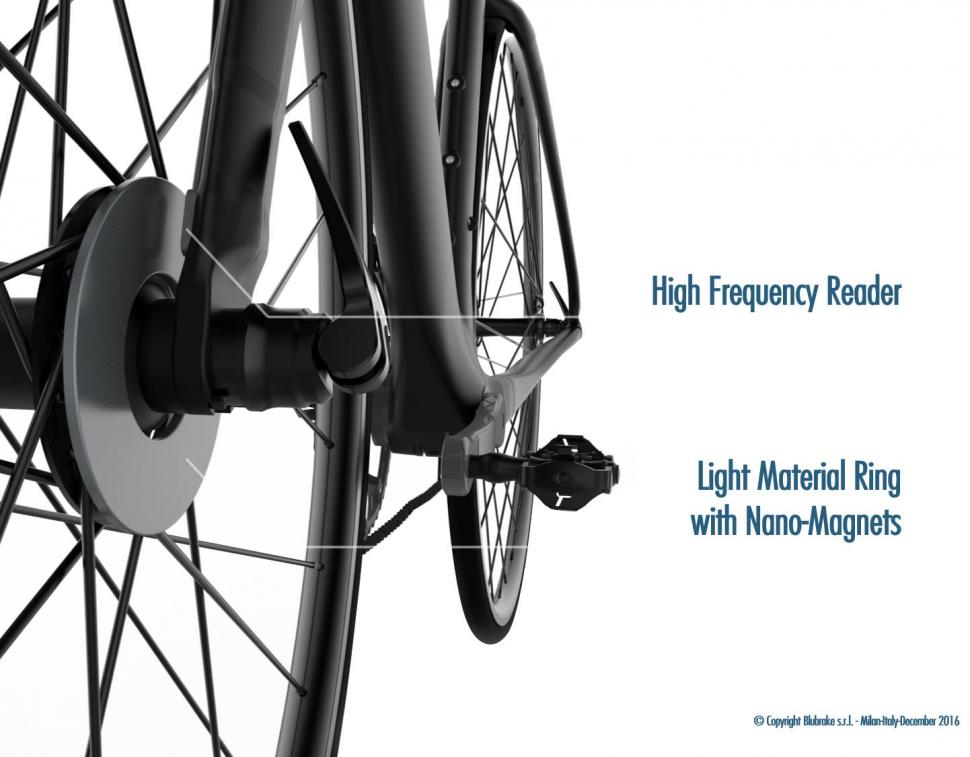- News
- Reviews
- Bikes
- Accessories
- Accessories - misc
- Computer mounts
- Bags
- Bar ends
- Bike bags & cases
- Bottle cages
- Bottles
- Cameras
- Car racks
- Child seats
- Computers
- Glasses
- GPS units
- Helmets
- Lights - front
- Lights - rear
- Lights - sets
- Locks
- Mirrors
- Mudguards
- Racks
- Pumps & CO2 inflators
- Puncture kits
- Reflectives
- Smart watches
- Stands and racks
- Trailers
- Clothing
- Components
- Bar tape & grips
- Bottom brackets
- Brake & gear cables
- Brake & STI levers
- Brake pads & spares
- Brakes
- Cassettes & freewheels
- Chains
- Chainsets & chainrings
- Derailleurs - front
- Derailleurs - rear
- Forks
- Gear levers & shifters
- Groupsets
- Handlebars & extensions
- Headsets
- Hubs
- Inner tubes
- Pedals
- Quick releases & skewers
- Saddles
- Seatposts
- Stems
- Wheels
- Tyres
- Health, fitness and nutrition
- Tools and workshop
- Miscellaneous
- Tubeless valves
- Buyers Guides
- Features
- Forum
- Recommends
- Podcast
TECH NEWS
Italian company Blubrake develops electronic anti-lock braking system for bicycles
Want to improve your braking? Italian company Blubrake has developed an anti-lock brake system for bicycles that aims to prevent the front wheel from locking and could prevent a crash.
“Blubrake system allows [you] to brake close to the friction physical limit of the road-wheel contact,” says the company.
The Blubrake project started life in 2013 at the Milan Polytechnic and is now being developed with Pinarello. The product is an anti-lock braking system that uses a range of sensors to let you know when the front wheel is about to lock, the idea being that the feedback, via vibrations at the brake lever, will let you know it’s probably a good idea to release the brake lever to avoid locking the front wheel.
What this system is not is automated like an anti-lock braking system (ABS) found in most modern motor vehicles. Instead of being automated, an actuator fixed to the brake lever begins to vibrate when the wheel is about to lock up, alerting you to ease the pressure on the brake lever to avoid locking the front wheel. The aim of the project is to “improve control of the vehicle and the athlete’s performance, dramatically reducing the risk of falls.”
“Our idea was then to put the rider in the centre of the braking, without isolating as does the Abs that in extreme conditions take command of the situation,” says Bluebrake’s Fabia Todeschini. “We add the rider a sixth sense. We use algorithms and artificial intelligence to predict locks the front wheel, resulting in a reversal of the cyclist, or lateral loss of grip.”
The system comprises four parts integrated into the bicycle. At the centre of it all is the Artificial Intelligence Control Unit and Inertial Measurement Unit, which is hidden away inside the seat tube and packed with sensors including accelerometers and gyroscopes to detect important data such as the gradient of the road and angular velocity. A speed sensor is fixed to the front hub, and a vibrating motor is fixed to the brake lever - the company is calling this part the Sixth Sense Haptic Actuator.
The final part of the jigsaw is the control interface that is mounted on the handlebar. It provides four settings depending on the riding and conditions of the road, and include tourism, travel, wet, dry and a customisable option, using the company’s own smartphone app to tailor the level of vibration at the brake lever.
It’s not intended to replace the skill of the cyclist in modulating the braking power but instead intended to help improve braking skill when it comes to braking forcefully. It could certainly be very useful in some situations we reckon, such as slick wet descents when judging braking input can be a bit trickier than in perfectly dry conditions. We certainly can’t wait to try it out and see if it’s a gimmick or has genuine potential.
The product has caught the eye of Pinarello. The company is now involved with the development, helping Blubrake to iron out the last few wrinkles. Don’t worry, you don’t need a Pinarello to use this system, it can be fitted to any bicycle.
“Our goal is to provide the best performing technologies to our runners and help them to be better performing and safe. The strategic partnership with Blubrake is in line with our goal and demonstrates our ability to innovate,” explains Fausto Pinarello.
The company has worked hard to make the whole package as light as possible. The total weight of the equipment is just 230g including the battery, and lighter if you have a bike with an electronic groupset as it can piggyback that battery instead. As for availability, it’s hoping to put it into production in the first half of 2017 with a price tag of €600-700. http://blubrake.it/
There have been several attempts at introducing anti-lock brakes to the bicycle before. Way back in 2009 when road.cc was still a fledging young website, we reported on the BudBrake that was claimed to be able to reduce stopping distances.
A more recent attempt at bringing anti-lock brakes to the bicycle is the SABS (Safe Anti-Locking Brake System) from the US. It works by adding a small device to the brake block which generates a braking frequency that pulses the brake block as it contacts the rim - at 30kph the brake is contacting the rim 12 times a second. According to the company, it can reduce braking distances by as much as 50%.
David worked on the road.cc tech team from 2012-2020. Previously he was editor of Bikemagic.com and before that staff writer at RCUK. He's a seasoned cyclist of all disciplines, from road to mountain biking, touring to cyclo-cross, he only wishes he had time to ride them all. He's mildly competitive, though he'll never admit it, and is a frequent road racer but is too lazy to do really well. He currently resides in the Cotswolds, and you can now find him over on his own YouTube channel David Arthur - Just Ride Bikes.
Latest Comments
- thax1 18 min 43 sec ago
Double points for that photo backdrop Mark1a, and for anyone that has a shelf bracket for their air duster canister.
- mattw 23 min 24 sec ago
This risks turning me into a hanger and flogger....
- wtjs 4 hours 23 min ago
In SE London, psychopath riders are the majority of people on bicycles Oh dear! another festive stealth anti-cyclist ☃️
- wtjs 4 hours 28 min ago
Well, you know the BMW drivers' saying: knock that house (hospital, social housing, care home, hospital...) down, could save 30 seconds on the trip!
- belugabob 5 hours 22 min ago
“It’s all very well to spend millions on facilities but if there’s no money for maintenance, it’s a waste of public money."...
- Spangly Shiny 6 hours 3 min ago
I had the pleasure of owning two of the featured builders here, in my history. When I joined the Army in 1971, I took with me my curly Hetchins:...
- Username 7 hours 8 min ago
Could Siobhán paint it red and noone would notice it?
- Spangly Shiny 21 hours 58 min ago
To paraphrase Field of Dreams, "Build it right and they will come: and use it!"
- Rendel Harris 1 day 19 min ago
And a Happy Christmas to you, road.cc staff!
- Rendel Harris 1 day 1 hour ago
The odds of not being able to find a single pedestrian - just one, note, "any pedestrian" - in an area containing more than about ten of them who...










Add new comment
11 comments
HOW MUCH DOES IT WEIGH?!
Rim brakes and ABS on bicycle is the same as drum brakes and ABS on a car... I do not know of any car with drum brakes and ABS combo and there might be a good reason for that. ABS works on motor bikes with disc drakes quite well. So, in theory ABS would work on a road bike with disc breaks. Even so, I would not use it if ABS system adds more than 1lbs to the weight of the bike.
I dont know, perhaps deloping this will eventually lead to car-like ABS. Could be a good thing for heavy ebikes? Nothing wrong with tec, you dont have to buy it, but development always leads to good things in the end (mostly, weapons, land mines etc come to mind)
Did a quick look around (by no means exhaustive) and there seems to be a lot of debate about ABS on motor bikes and its worth. MotoGP bikes have traction control but not ABS - I'm sure if it provided a significant advantage they would have it. Suggestion is that ABS helps braking in straight line but not in a corner which seems to back up the "emergency stop" comments above. Times my car has resorted to ABS I've only realised what was happening when the car was stopped i.e. a vibrating brake lever would be waaay to late.
If you need this on a bicycle, you've already crashed IMO. The time taken to respond to its 'tactile feedback' plus the possibility of people braking in 'blind panic' means the situation probably isn't going to be saved by this.
I'm always amazed by a load of the helmetcam vids where people go into the side of cars and I'm not quite sure why they couldn't stop. When i'm on my MTB popping down the shops I can bring that thing to stop from 20mph or less within yards and that's got entry level shimano hydraulics on it. Then again, I like heavy breaking as it's a leftover from the days I used to hoon about on a motorbike or from general stuntery on BMX and MTB. I guess, like driving, some people panic when they really need to brake because they've not practiced it as such.
Nail on head. Until its unobtrousive and does the same as a car ABS its not worth it. Fatter tires lower pressure means you can go faster on poor roads with more comfort and safety.
I'm a bit baffled by all of this, as AFAIK, in good conditions, the limiting factor to deceleration is not the grip between the front wheel and the tarmac - it's stopping the rear wheel lifting by how far you can push your weight back. (unless you're riding a tandem, which it is possible to skid the front wheel).
If you're riding in the wet, or ice, then maybe...
If you don't know how to brake safely i am not sure having a vibrating brake lever will offer any help. in the situation where you really need it , i.e in panic braking, you are not going to be aware enough or fast enough to respond to the extra information .
doesn't seem to offer any real help for the inexperienced nor the experienced.
Most people can benefit from disk brakes, electronic shifting can alleviate the adjustment issues with gears but this I cannot work out.
Car ABS works because you slam your foot to the floor and it keeps the brakes pumping on and off to keep control - it works with you instinct (despite most people not braking hard enough in many situations) This just gives you more info to confuse the sitaution.
we really dont need this, just more ways to overcomplicate the simple art and beauty of cycling, as well as making the manufacturers lots of money
How cool will this be ultimately. I know we argue all day about technology and whether it's needed e.g. di2, powermeters etc but ABS would be incredible.
Not sure about the concept of alerting you though rather than taking control. I don't want it when I'm in control and could react to tactile feedback, I want it for those blind panic situations where a car pulls out and you just wildly slam the brakes on.
People have been 'over complicating' bikes ever since the bike began. Mudguards, gears, racks, bottle cages, lights, etc. Strip it back and all of these items serve a sensible purpose, but all in essence complicate the simplicity of the bike.
As for full ABS, I don't want that. I like the idea that I'm still in control. ABS on cars and motorbikes are extremely good idea because for normal driving and riding, trying to brake a massive lump (a lump that changes weight often due to passengers/no passengers and lugauge/no lugauge), in control, as quickly as possible is pretty tricky.
A bike on the other hand is light and the combined weight of bike and rider is generally quite consistent. Plus, we are more directly connected with the 'feel' of the bike, so are more able to respond to the changes that occur when a wheel locks.
Add into that the fact that sometimes a locking of the rear wheel can actually be helpful (more so off road than on road, admitidly), and full ABS becomes unecessary and potentially a hindrance.
The idea of something alerting you to on imminent lock-up is a really interesting. When riding we brake on instinct, but that instinct comes from may 'braking moments' which over time lead to the mussle memory required to apply the right amount of braking force for a given situation. This device could help you hone that instinct, meaning that full ABS becomes less of a potential benefit even in 'panic braking' scenarios.